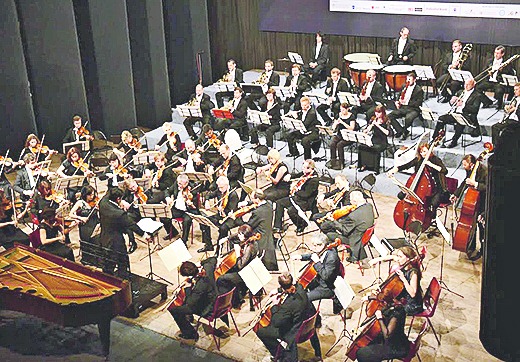
It is a rare concert that evokes many disparate memories with equal intensity, so that listeners can recover lost threads and spin skeins of time and place, reeling them in to reconstruct the fragments of their lives. The Grand Finale concert of the Calcutta School of Music's centennial celebrations was one such: the rich, resonant sounds of the Bohuslav Martinu Orchestra conducted masterfully by Debashish Chaudhuri, along with Jana Chaudhuri's powerful pianism, made this concert a first for this city in many decades.
The raging turbulence of the first bars of Beethoven's Coriolan Overture found a telling counterpoint in the yearning, pleading second theme, juxtaposing the ruggedness of Beethoven's later compositions with a Mozartian tenderness. The conductor's mature handling of this ensured that contrasting phrases and moods flowed into each other naturally, with an admirable simplicity.
In both the works that followed - Tchaikovsky's Piano Concerto No. 1 and Dvorak's New World Symphony - the conductor followed a very risky strategy of choosing unusually slow tempi, wherever the orchestral markings allowed it: unless every strand of music is endowed with thought and feeling, this risks discontinuity of performance and audience inattention. In this case, however, the gamble paid off fully, allowing the orchestra to linger over the contours of the music, bringing to full musical light fragments that are often glossed over, and drawing the audience into the complete narrative of each piece.
Tchaikovsky's Piano Concerto No. 1 is often referred to as a 'man's concerto' because of the sheer physical power needed by the soloist: Martha Argerich is one of the rare women pianists whose performance of this is truly legendary. Commendably, the pianist, Jana Chaudhuri, was able to do full justice to the muscularity of this work in its outer movements, as well as endowing its more reflective parts (particularly the wistful Andantino Semplice) with a poignant delicacy.
The warm rounded tones, the emotional expressiveness for which East European orchestras are justly famous, were very much in evidence throughout, and indispensable to, the grip of the music on its audience. In particular, the conjuring up of America's 'wide open spaces' (Dvorak was in the US when he wrote this late Romantic Symphony), their contrast with the reminiscences of a lost world in the nostalgic Largo, and the unremitting, passionate advance towards a stormy unknown in the last movements, were brilliantly executed. Listeners were transported to the realms of memory, desire and dreams by this wordless magic, so aptly summed up by Hans Christian Andersen: "Where words fail, music speaks."
The two encores - Dvorak's Humoresque and a Tagore song - were well received by an enthusiastic audience. However, the first full orchestral concert in Calcutta for many decades has left many of us wanting much more.










